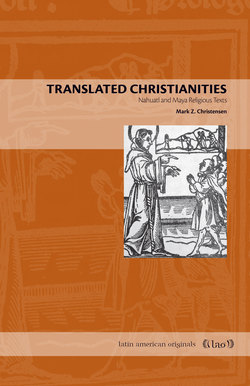Читать книгу Translated Christianities - Mark Z. Christensen - Страница 8
На сайте Литреса книга снята с продажи.
ОглавлениеFOREWORD
Latin American Originals (LAO) is a series of primary source texts on colonial Latin America. LAO volumes are accessible, affordable editions of texts translated into English—most of them for the very first time. Of the eight volumes now in print, five illuminate aspects of the Spanish conquests during the long century of 1494–1614, and three push our understandings of the spiritual conquest into surprising new territories.
Taken in the chronological order of their primary texts, LAO 7 comes first. Of Cannibals and Kings presents the very earliest written attempt to describe the native cultures of the Americas. An early ethnography, written by a Catalan named Ramón Pané, is packaged with complementary Spanish texts about the Caribbean societies of the late 1490s. Together they offer startling new insight into how the first Europeans in the Americas struggled from the very start to conceive a New World.
Following the chronological sequence of their source materials, LAO 2 comes next. Invading Guatemala shows how reading multiple accounts of conquest wars (in this case, Spanish, Nahua, and Maya versions of the Guatemalan conflict of the 1520s) can explode established narratives and suggest a conquest story that is more complicated, disturbing, and revealing. LAO 1, Invading Colombia, challenges us to view the difficult Spanish invasion of Colombia in the 1530s as more representative of conquest campaigns than the better-known assaults on the Aztec and Inca empires.
LAO 3, The Conquest on Trial, features a fictional embassy of native Americans filing a complaint over the conquest in a court in Spain—the Court of Death. That text, the first theatrical examination of the conquest published in Spain, effectively condensed contemporary debates on colonization into one dramatic package. LAO 4, Defending the Conquest, is a spirited, ill-humored, and polemic apologia for the Spanish Conquest written by Bernardo de Vargas Machuca, a lesser-known veteran conquistador, and submitted for publication—without success—in 1613.
Volumes 5, 6, and 8 all explore aspects of Spanish efforts to implant Christianity in the New World. LAO 5, Forgotten Franciscans, casts new light on the spiritual conquest and the conflictive cultural world of the Inquisition in sixteenth-century Mexico. Both it and LAO 6 show how there were wildly divergent views within the church in Spanish America both on native religions and on how to replace them with Christianity. Gods of the Andes presents the first English edition of a 1594 manuscript describing Inca religion and the campaign to convert native Andeans. Its Jesuit author, Blas Valera, is surprisingly sympathetic to pre-conquest beliefs and practices, viewing them as preparing Andeans for the arrival of the faith he helped bring from Spain.
In this new offering, LAO 8, Translated Christianities, Mark Christensen presents religious texts in Nahuatl and Yucatec Maya, which he himself has translated into English. Designed to help proselytize and ensure the piety of indigenous parishioners in central Mexico and Yucatan, these texts show how such efforts actually contributed to the development of local Christianities. As in other parts of the Americas, native cultures thrived within the conversion process, leading to fascinatingly multifaceted outcomes.
The source texts to LAO volumes are either archival documents—written in European languages, most obviously Spanish, or indigenous languages, such as Nahuatl and Maya—or rare books published in the colonial period in their original language. The contributing authors are historians, anthropologists, and scholars of literature; they have developed a specialized knowledge that allows them to locate, translate, and present these texts in a way that contributes to scholars’ understanding of the period, while also making them readable for students and non-specialists.
In that varied firmament, Mark Christensen is a rising star. A historian comfortable working with sources in multiple languages, including two Mesoamerican tongues, he has already published a groundbreaking monograph, titled Nahua and Maya Catholicisms, that acts as LAO 8’s hefty sibling. As Mark received his PhD at Penn State, it is serendipitously appropriate for his work to contribute to the evolution of the LAO series.
—Matthew Restall
